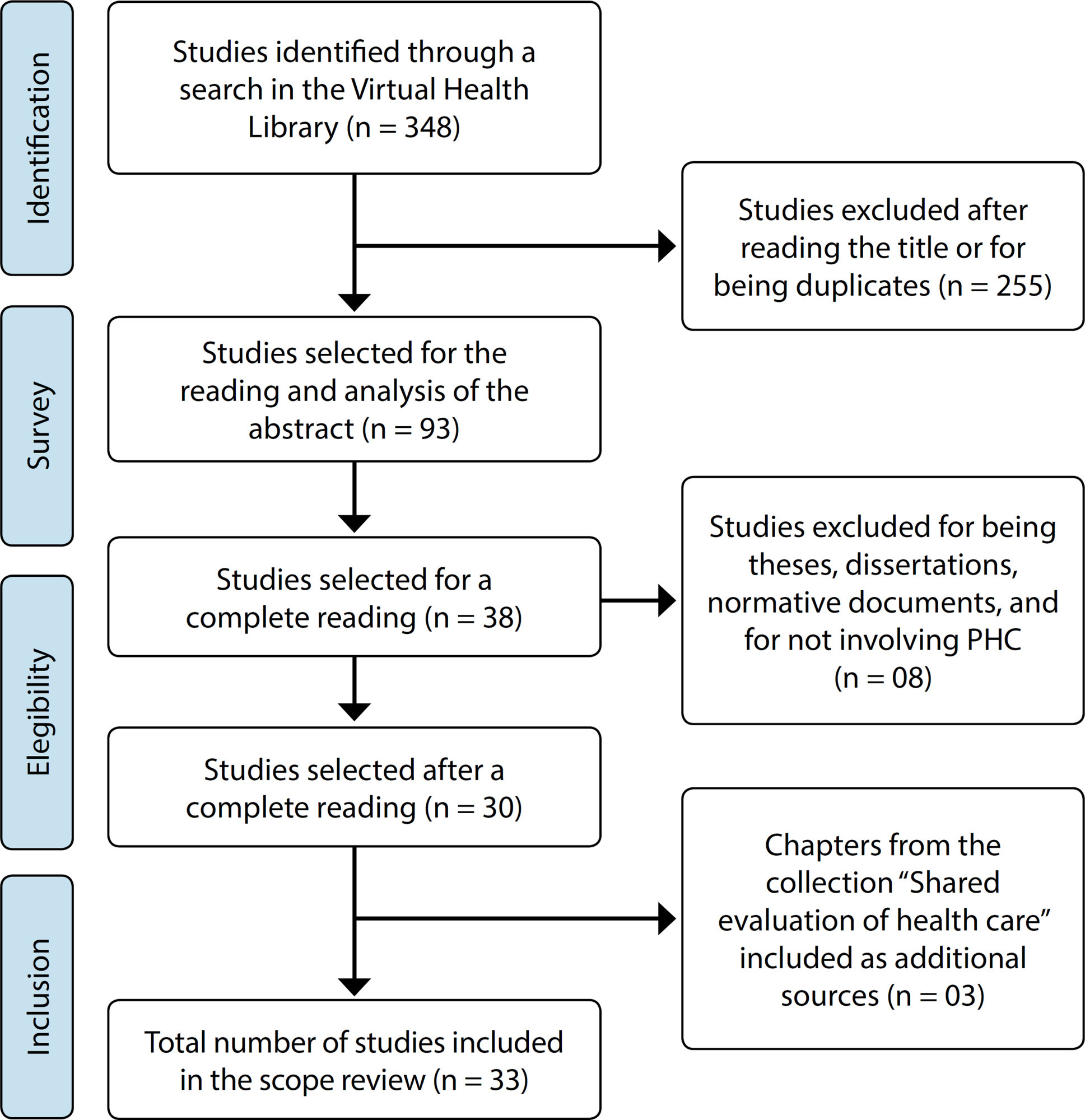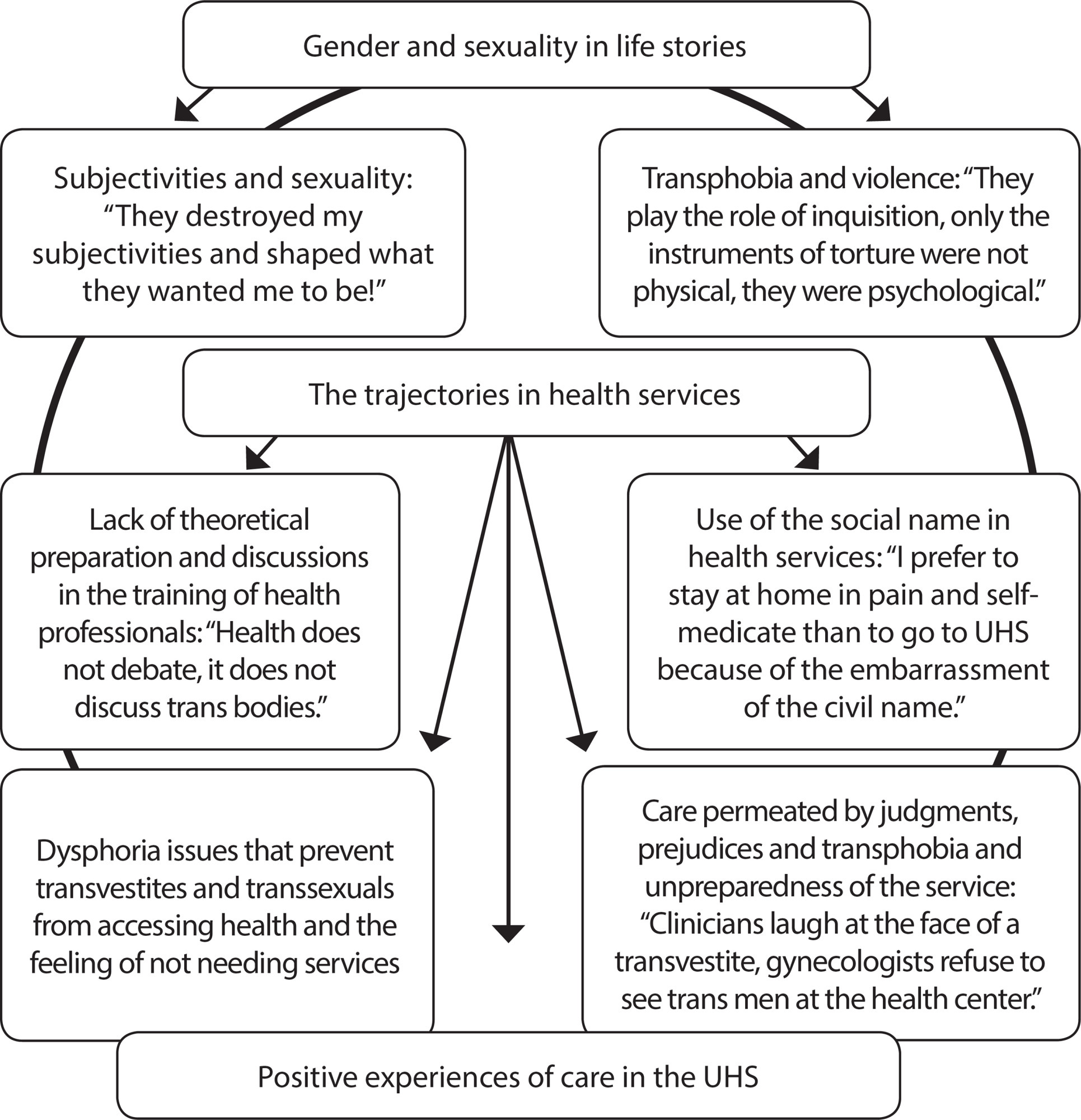-
REVIEW
Challenges and potentials of the production of comprehensive care in Primary Health Care in Brazil
Revista Brasileira de Enfermagem. 2021;74(5):e20210008
07-23-2021
Resumo
REVIEWChallenges and potentials of the production of comprehensive care in Primary Health Care in Brazil
Revista Brasileira de Enfermagem. 2021;74(5):e20210008
07-23-2021DOI 10.1590/0034-7167-2021-0008
Visualizações0ABSTRACT
Objective:
To identify relational and organizational barriers related to the production of care and to map strategies and tools that favor comprehensive care.
Methods:
Scoping review of Brazilian publications from 2008 to 2018, related to the production of care in Primary Health Care. From the 348 studies found in the Virtual Health Library, 30 made up the final sample. Three book chapters were added, totaling 33 documents.
Results:
Three thematic categories were organized: Relational dimension between health professionals and users; Interactive dimension of the teamwork process; Organizational dimension and articulation in networks. Challenges of health practices out of context of the users’ needs; inflexible and bureaucratic work processes; and organizational barriers to the access are highlighted. The potentials of mapped tools involved embracement, interprofessional actions and instituting care networks.
Final considerations:
The overview of challenges and processes that induce good practices facilitate a decision-making that is committed with comprehensive care.
Palavras-chave: Comprehensive Health CarePatient Care TeamPrimary Health CarePublic Health PolicyPublic Health PracticeVer mais
-
ORIGINAL ARTICLE
Integrality and comprehensiveness of service provision in Primary Health Care in Brazil (2012-2018)
Revista Brasileira de Enfermagem. 2021;74(2):e20200500
05-28-2021
Resumo
ORIGINAL ARTICLEIntegrality and comprehensiveness of service provision in Primary Health Care in Brazil (2012-2018)
Revista Brasileira de Enfermagem. 2021;74(2):e20200500
05-28-2021DOI 10.1590/0034-7167-2020-0500
Visualizações0ABSTRACT
Objectives:
to analyze comprehensiveness elements in Primary Care in Brazil, between 2012 and 2018, considering preventive and assistance aspects, pointing out advances and obstacles to its improvement in different contexts.
Methods:
a retrospective longitudinal study using data from the Brazilian National Program for Improving Access and Quality in Primary Care. 15,378 teams were selected that participated in both 1st and 3rd cycles of the program.
Results:
improvements were found in the prevalence of teams that ensure preventive and assistance care for priority groups, who develop promotion actions, offer essential procedures, including oral health, carry out home visits, receive support from Extended Family Health and Primary Care Center, offer integrative and complementary practices and develop intersectoral actions.
Conclusions:
there has been an improvement in comprehensiveness in Primary Health services, but problems remain that still need to be faced for their improvement.
Palavras-chave: Comprehensive Health CareHealth EvaluationHealth PolicyHealth ServicesPrimary Health CareVer mais -
ORIGINAL ARTICLE
Integration strategies for caring for chronic noncommunicable diseases: a case study
Revista Brasileira de Enfermagem. 2021;74(1):e20190563
03-24-2021
Resumo
ORIGINAL ARTICLEIntegration strategies for caring for chronic noncommunicable diseases: a case study
Revista Brasileira de Enfermagem. 2021;74(1):e20190563
03-24-2021DOI 10.1590/0034-7167-2019-0563
Visualizações0ABSTRACT
Objectives:
to identify the strategies for integrated care used regarding Chronic Noncommunicable Diseases in a Health District.
Methods:
a case study developed in a district of a municipality in southern Brazil, with 34 participants (coordinators and nursing assistants). Data were collected between August 2016 and June 2017, through interviews, documents and computerized files. To organize the data, the MAXQDA® software was used. Analysis took place using the Integrated Care Network model.
Results:
integration strategies were highlighted in the systemic, normative and functional dimensions, such as coordination, district organization, Annual Operating Plan, information system, and user management service.
Final Considerations:
the district comprises a structure that enables interactions through various tools; among these, coordination represents an effective strategy to enhance care, boost cooperation among professionals and support and manage the district.
Palavras-chave: Case ReportsChronic DiseaseComprehensive Health CareHealth Services AdministrationNursesVer mais -
ORIGINAL ARTICLE
“Health does not discuss trans bodies”: Oral History of transsexuals and transvestites
Revista Brasileira de Enfermagem. 2020;73(suppl 6):e20190228
10-28-2020
Resumo
ORIGINAL ARTICLE“Health does not discuss trans bodies”: Oral History of transsexuals and transvestites
Revista Brasileira de Enfermagem. 2020;73(suppl 6):e20190228
10-28-2020DOI 10.1590/0034-7167-2019-0228
Visualizações0ABSTRACT
Objectives:
to understand the life stories and itineraries of transvestites and transsexuals in health services.
Methods:
study with a qualitative approach, anchored in the methodological framework of Oral History. Interviews were conducted and thematically analyzed.
Results:
two themes emerged: 1) gender and sexuality in life stories; and 2) the trajectories in health services. These revealed the challenges in the process of recognizing gender identity before the family and society. The reports show the dilemmas that transsexuals and transvestites face in health care, which ends up generating the removal of this population from services.
Final Considerations:
it has been demonstrated that Oral History can increase knowledge, especially about life histories and trajectories in the health services of transvestites and transsexuals; in addition, information was offered that can assist managers and health professionals in making decisions or caring for these people.
Palavras-chave: Comprehensive Health CareGender IdentityMinority HealthPublic HealthTransgender PersonsVer mais
-
ORIGINAL ARTICLE
Mental Health Nursing: waiting room intervention in integral health care
Revista Brasileira de Enfermagem. 2020;73(Suppl 1):e20180886
07-10-2020
Resumo
ORIGINAL ARTICLEMental Health Nursing: waiting room intervention in integral health care
Revista Brasileira de Enfermagem. 2020;73(Suppl 1):e20180886
07-10-2020DOI 10.1590/0034-7167-2018-0886
Visualizações0ABSTRACT
Objective:
To describe and to analyze the proposal for intervention in the waiting room as a possibility for Nursing in mental health in group context.
Method:
Descriptive study with a qualitative approach, convergent care type, developed in a Psychosocial Care Center for Alcohol and Drugs in the interior of the state of Goiás.
Results:
The service in the waiting room provided moments of reflection, knowledge, learning, listening and exchanging experiences.
Final considerations:
The meetings in the waiting room favored the articulation between theoretical knowledge and the practice of nursing care in groups, constituting a space with a valuable locus for the development of educational and support actions in health services, to be undertaken by the nurse and, also, by other professionals of the health team.
Palavras-chave: Comprehensive Health CareMental HealthMental Health ServicesNursingPsychiatric NursingVer mais -
ORIGINAL ARTICLE
Institutional violence in high-risk pregnancy in the light of pregnant women and nurses
Revista Brasileira de Enfermagem. 2020;73(5):e20180816
07-01-2020
Resumo
ORIGINAL ARTICLEInstitutional violence in high-risk pregnancy in the light of pregnant women and nurses
Revista Brasileira de Enfermagem. 2020;73(5):e20180816
07-01-2020DOI 10.1590/0034-7167-2018-0816
Visualizações0Ver maisABSTRACT
Objective:
to understand the perception of high-risk nurses and pregnant women about institutional violence in access to basic and specialized care networks in pregnancy.
Method:
a qualitative study developed from March to June 2017 in the city of Fortaleza, state of Ceará, with nurses and pregnant women at high risk. A semi-structured interview was used, analyzed by the thematic analysis technique. Three categories emerged: access of pregnant women to care networks; institutional violence in the perception of nurses; and institutional violence in the perception of pregnant women.
Results:
participants revealed deficiencies in knowledge about institutional violence. Nurses perceived this violence in the lack of resources and access, few recognized as a violation of rights. The pregnant women reported deficient access to care networks, medicines, tests, and did not perceive this difficulty as violence.
Final considerations:
institutional violence is present in high-risk pregnancy, nurses and pregnant women do not always perceive this violence as a violation of rights.
-
ORIGINAL ARTICLE
Prisoners of suffering: perception of women on violence practiced by intimate partners
Revista Brasileira de Enfermagem. 2020;73(Suppl 1):e20190219
06-01-2020
Resumo
ORIGINAL ARTICLEPrisoners of suffering: perception of women on violence practiced by intimate partners
Revista Brasileira de Enfermagem. 2020;73(Suppl 1):e20190219
06-01-2020DOI 10.1590/0034-7167-2019-0219
Visualizações0Ver maisABSTRACT
Objective:
to describe the perceptions of women, prisoners or partners of imprisoned men who experience/experienced intimate partner violence, and how they cope with this situation.
Method:
a descriptive exploratory study with a qualitative approach conducted with 21 women. Empirical data collected between March and August 2018, through audio-recorded semi-structured interviews, were submitted to thematic content analysis.
Results:
women reported experiencing different forms of violence, which triggered suffering and negative commitment in their lives, far beyond the act itself, especially by the emotional and physical marks and their consequences. They also realize that coping with violence is individual responsibility, lived in the counterpoint between the desire to overcome it and passivity.
Final considerations:
intimate partner violence was uniquely revealed by women as a solitary experience, with permanent consequences in the physical, emotional, patrimonial, sexual and moral spheres, and limited internal and external resources make it difficult to cope with it.
-
ORIGINAL ARTICLE
Professional skills for health promotion in caring for tuberculosis patients
Revista Brasileira de Enfermagem. 2020;73(2):e20180943
03-30-2020
Resumo
ORIGINAL ARTICLEProfessional skills for health promotion in caring for tuberculosis patients
Revista Brasileira de Enfermagem. 2020;73(2):e20180943
03-30-2020DOI 10.1590/0034-7167-2018-0943
Visualizações0ABSTRACT
Objectives:
to understand the health promotion skills found in the speeches of health practitioners in care for TB patients.
Methods:
qualitative study, developed with seven practitioners involved in care for TB patients, identified from a sociocentric approach, whose speeches were submitted to analysis based on the health promotion skills model in the Galway Consensus.
Results:
there were four domains: Catalyzing change; Leadership; Planning; and Partnerships. These domains resulted from health education actions, contribution of management nursing practitioners, seeking to meet patients’ needs and articulation of professional sectors.
Final considerations:
there were some skill domains in the speeches of health practitioners, with the nurse being quoted in the development of essential skills for health promotion activities, such as catalyzing change and leading care for TB patients.
Palavras-chave: Comprehensive Health CareHealth PersonnelHealth PromotionPrimary Health CareTuberculosisVer mais



